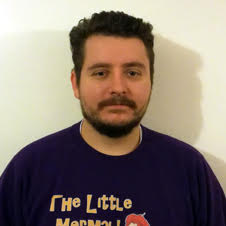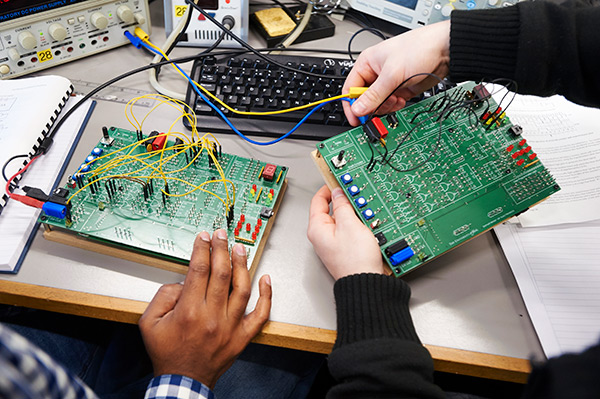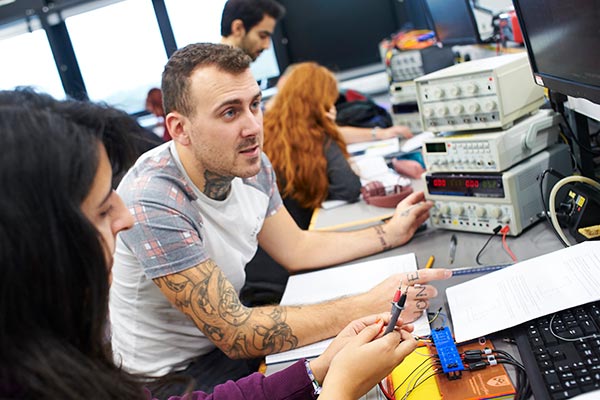View semester dates

BEng (Hons) Electronic Engineering (with a foundation year)
Blend creativity with maths, science and technology to design and engineer innovative solutions
Year of entry: 2026/27
View semester dates
If you're returning to education, or didn't study Maths at A level, our foundation year will update the maths and physics knowledge you need to transfer onto one of our Electronics or Engineering degree courses.
You'll spend your first year learning maths and physics content to A level standard, and you'll begin to develop your practical skills in the electronics lab.
If you successfully complete the foundation year you'll automatically continue onto the first year of our BEng Electronic Engineering course or one of our other specialist BEng courses. In addition, if you achieve a high score in the Foundation Year exams you will have the opportunity to transfer onto one of our MEng courses.
This course will enable you to function with confidence in the challenging world of electronic engineering, as a designer, in research or as a manager. You'll work with world-class researchers who are advancing our understanding of electronic engineering every day.
Our courses are very flexible, and offer you the opportunity to either become a specialist or generalist. You can choose your own route through your degree. You'll be fully supported at all times by staff who are enthusiastic about their subjects and willing to help you.
Year in industry
All of our courses are available with a year in industry, which gives you the opportunity to gain vital experience in the workplace and find out more about your career options. The year in industry is generally taken in the year prior to your final year of study.
The School will help you to find a suitable placement. You will be fully supported by an academic member of staff who will visit you in the workplace and meet you regularly to discuss your placement work.
Accreditation
This course is fully accredited by the IET and counts towards the training requirements for Chartered Engineer (CEng) status. Our courses have been continually accredited for 25 years.

As I was returning to education, the Foundation Year was brilliant, providing a solid grounding in higher level Maths and Physics, and confirming Electronic Engineering was for me. It has been enjoyable and a fantastic challenge to study at the University of York and the city is a delightful place to call home.
Course content
You'll study the principles and practicalities of electronic engineering, as well as honing essential skills in mathematics and computer programming.
As you progress, you'll cover topics such as electronic hardware design, software programming, signal processing and analysis, microprocessor interfacing, engineering construction and design, feedback and computer control. In your final year, advanced option modules allow you to specialise according to your own developing interests, in areas from digital communications to nanoelectronics.
Throughout your course you'll have opportunities to apply your learning in our well-equipped labs. Individual and group projects will see you design, build and test products using state-of-the-art hardware and software.
Foundation year
The foundation year is based on the A level curricula for maths and physics.
The first part of the course starts at an early secondary school level and progresses through to A level standard over the year. There are also practical physics and electronics activities where you’ll learn in a well-equipped laboratory.
Core modules
- Mathematics 1
- Physics 1
- Skills for Engineering and the Physical Sciences 1
- Mathematics 2
- Physics 2
- Skills for Engineering and the Physical Sciences 2
Academic integrity module
In addition to the above you will also need to complete our online Academic Integrity module.
Year 1
Core modules
Year 2
Core modules
- Mathematics, Signals and Systems
- Electronic Engineering Project
- Circuit Design
- Control, Sensors and Instrumentation
- Software Design
Option modules
You will study one option module. Examples can be found below. Some option module combinations may not be possible. The options available to you will be confirmed after you begin your course.
- Electromagnetism
- Semiconductor Physics and Devices
- Electrical Circuits and Systems
- Data Analysis and Numerical Methods
Elective modules
You may be able to replace one option module with an elective module, studying a complementary subject, a language or an interdisciplinary topic.
Year 3
Core modules
Option module
You will study three option modules. Examples can be found below. Some option module combinations may not be possible. The options available to you will be confirmed after you begin your course.
- Applications of Electromagnetics
- Innovation Management
- Robotics Design and Construction
- Biomedical Engineering
- Renewable Power Generation
- Digital Signal Processing
- Mobile Communications and Internet Protocols
- Photonics and Nanoelectronics
- Advanced Sensors and Instrumentation
- Digital Engineering
- Cloud and Distributed Computing
- Photovoltaics and Solar Thermal Tech
- Electric Powertrain Design
Elective modules
You may be able to replace one option module with an elective module, studying a complementary subject, a language or an interdisciplinary topic.
Our modules may change to reflect the latest academic thinking and expertise of our staff, and in line with Department/School academic planning.
Learning outcomes
Every course at York has been designed to provide clear and ambitious learning outcomes. These learning outcomes give you an understanding of what you will be able to do at the end of the course. We develop each course by designing modules that grow your abilities towards the learning outcomes and help you to explain what you can offer to employers. Find out more about our approach to teaching and learning.
Learning outcomes for this course
- Subject Knowledge: Assess electronic engineering designs by applying detailed knowledge of algorithms, devices and systems and by consulting relevant documentation and research.
- Engineering Analysis: Analyse system & component performance through computational methods and modelling.
- Engineering Design: Create designs to address real-world problems by synthesising ideas into engineering specifications.
- Practical Skills: Solve technical problems through employing skills in programming, CAD, construction and measurement and by using safe laboratory techniques
- Technical Communication: Clearly communicate and explain electronic engineering issues and practice in a technically accurate manner to a variety of audiences, verbally, in writing and using multimedia.
- Management & Personal Development: Coordinate and execute complex projects in electronics, computing and related disciplines, with effective time management, team working, and ethical decision-making.
Fees and funding
The fees and funding information here is for students starting in the 2026/27 academic year.
If you take a year abroad or year in industry you'll pay a reduced rate of fees for that year.
Annual tuition fees
| UK (home) | International and EU |
|---|---|
| £9,535 (TBC) | £32,350 |
The UK government has announced its intention to increase tuition fees from £9,535 to £9,790 for the 2026/27 academic year. We expect this to apply to new UK (home) undergraduate students starting their studies in September 2026.
UK (home) or international fees?
The level of fee that you will be asked to pay depends on whether you're classed as a UK (home) or international student. Check your fee status.
Fees for subsequent years
- UK (home) fees may increase within the government fee cap in subsequent academic years. We will notify you of any increase as soon as we can.
- International fees are subject to increase in subsequent years in line with the prevailing Consumer Price Index (CPI) inflation rate (up to a maximum of 10%).
More information
For more information about tuition fees, any reduced fees for study abroad and work placement years, scholarships, tuition fee loans, maintenance loans and living costs see undergraduate fees and funding.
Additional costs
There is no compulsory purchase of equipment or books necessary for this course. Lecture notes will be provided by staff, and you will be given a generous printing allowance.
Funding
We'll confirm more funding opportunities for students joining us in 2026/27 throughout the year.
- UK government loans
- UK scholarships and bursaries
- International scholarships
- Country-specific funding
- US loans
Foundation year scholarships
The School of Physics, Engineering and Technology offers a number of scholarships for the best performing foundation year students, after the first semester of the course.
York, Oxford, Cambridge, Imperial
Just four UK universities are rated Gold for teaching and top ten for research* in the latest national assessment exercises.
* Awarded joint 10th in the Times Higher Education ranking of the Research Excellence Framework 2021.
Teaching and assessment
You’ll study and learn with academics who are active researchers, experts in their field and have a passion for their subjects. Our approach to teaching will provide you with the knowledge, opportunities, and support you need to grow and succeed in a global workplace. Find out more about our approach to teaching and learning.
Teaching format
Our courses are highly intensive. Your timetabled activities each week will include:
- Lectures
- Practical work (including projects every year)
- Workshops and tutorials
- Computer laboratories
- Supervisions
You'll also be expected to spend time studying independently. As you progress through the course you'll take on more independent study, guiding your own learning and developing your project management skills.
An academic member of staff will help guide you through your final-year individual project, ensuring that you are able to combine the knowledge and skills you have learned throughout the course to successfully undertake an engineering project tailored to your interests and career goals.
Timetabled activities
In your first year, you can expect:
| Lectures | 15 hours per week |
|---|---|
| Workshops | 2 hours per week |
| Practicals | 4 hours per week |
| Optional activities | 0-2 hours per week |
These figures are representative of a typical week. Your contact hours will vary throughout the year due to your module choices, non-compulsory classes, exam periods and changes to scheduled activities.
Outside your timetabled hours, you'll study independently. This may include preparation for classes, follow-up work, wider reading, practice completion of assessment tasks, or revision.
In the UK, full-time students are expected to spend 1,200 hours a year learning. That's about 40 hours of classes and independent study each week during semesters. Everyone learns at a different rate, so the number of hours you spend on independent study will be different to other students on your course.
Facilities
You can find detailed descriptions of our facilities on our website, including laboratory space, recording studios, clean room and computing classrooms.
Teaching location
You will be based in the School of Physics, Engineering & Technology on Campus West.
Most of your contact hours will be in the School of Physics, Engineering & Technology, with some additional teaching on Campus West.
About our campus
Our beautiful green campus offers a student-friendly setting in which to live and study, within easy reach of the action in the city centre. It's easy to get around - everything is within walking or pedalling distance, or you can use the fast and frequent bus service. Take a campus tour.
Assessment and feedback
Your assignments will be designed not just to test you but for you to creatively apply what you've learned, and to stretch you to supply novel solutions. We use a variety of assessment styles, including exams, coursework and practical engineering tasks. You'll encounter all of them during your course, but the exact balance will depend on the modules you choose:
- Closed-book and open-book exams
- Short technical reports
- Electronic portfolios, including programming exercises, video reports or blogs
- Presentations and demonstrations
- Major technical reports
You'll receive written feedback on work you hand in to help you understand your grade and develop your skills. For your final-year individual project you'll produce a written report, have a viva (a presentation and question/answer session) and also show your project on our demo day, which our external advisory board attend.
Careers and skills
The growth of the electronics industry means demand for new engineers is always high. Our students enter a wide range of jobs, not just in electronic engineering, but in a variety of related fields such as software programming and hardware development
For those wishing to take different career paths, the transferable skills you'll develop are highly valuable. Mathematics, programming, team working and technical management are sought after in a huge range of sectors, from media to financial services. Recent employers have included Jaguar Land Rover, IBM, Qinetiq, ARM, BBC, BT and Network Rail. Find out more about our graduate destinations and graduate profiles.
Career opportunities
- Avionic systems engineering
- Design engineering
- Digital consultancy
- Software and systems engineering
- Cyber security
- Telecommunications design
- Broadcast engineering
- Automotive safety
- Visual effects
Transferable skills
- Analyse system and component performance through computational methods and modelling
- Create designs to address real-world problems by synthesising ideas in engineering specifications
- Solve technical problems through applying skills in programming, CAD, construction and measurement
- Communicate and explain electronic engineering issues to a variety of audiences verbally, in writing, and using multimedia
- Assess designs by applying detailed knowledge algorithms, devices and systems, and consulting relevant research
- Coordinate and execute complex projects
- Effective time management, teamworking and ethical decision making
Entry requirements
| Qualification | Typical offer |
|---|---|
| A levels | BBB If you already have, or are currently studying A level Maths you should apply for one of our degree programmes without a foundation year. |
| Access to Higher Education Diploma | 21 credits at Distinction and 24 credits at Merit or higher |
| BTEC National Extended Diploma | DDM in any subject |
| International Baccalaureate | 31 points. If you are studying Mathematics - Applications and Interpretation at Higher Level or Mathematics - Analysis and Approaches at Standard Level or Higher Level, please apply for one of our degree courses without a foundation year. |
| T levels | We will consider a range of T Level qualifications for entry. Please visit our dedicated T Levels page for a full list of accepted T Levels. |
| Scottish Highers / Advanced Highers | Scottish Highers - BBBBB Advanced Highers - not required for entry We may also be able to consider three Advanced Highers or a combination of Highers and Advanced Highers, where an applicant does not meet the grade requirement through Highers alone. Please contact us to discuss your qualifications. |
| Other international qualifications | Equivalent qualifications from your country |
Additional requirements
We typically expect applicants to have GCSE Maths at grade 5 (or equivalent). We consider applicants from a wide range of backgrounds and holding combinations of qualifications. Please get in touch with us for an informal discussion if you are interested in our foundation year but are unsure whether you meet our criteria.
Applicants are usually interviewed and we will look for evidence during our discussion that you are capable of dealing with the workload of the foundation year.
Alternative offers
Meeting the following additional criteria may qualify you for an alternative offer.
| Criteria | Adjustment |
|---|---|
| Widening participation | BCC This is conditional upon successful completion of the WP programme including the YorJourney module (Black Access Programme, Next Step York) or successful completion of Realising Opportunities More about widening participation. |
| Contextual offer | BBC |
| EPQ | If you achieve C or higher in the EPQ, you may be eligible for an alternative offer up to one A level grade (or equivalent) below our typical offer. |
| Core Maths | If you achieve B or higher in Core Maths, you may be eligible for an alternative offer up to one A level grade (or equivalent) below our typical offer. |
English language
If English isn't your first language you may need to provide evidence of your English language ability. We accept the following qualifications:
| Qualification | Minimum requirement |
|---|---|
| IELTS (Academic) | 6.0, with a minimum of 5.5 in each component |
| IB English | A score of 4 in English A or 5 in English B (Higher Level or Standard Level) |
| Cambridge CEFR | 169, with a minimum of 162 in each component |
| Oxford ELLT | 6, with a minimum of 5 in each component |
| Oxford Test of English Advanced | 126, with a minimum of 116 in each component |
| Duolingo | Integrated subscores: 105, minimum 95 in each component |
| GCSE/IGCSE/O level English Language (as a first or second language) | Grade C / Grade 4 |
| LanguageCert SELT | B2 with a minimum score of 33/50 in each component |
| LanguageCert Academic | B2 with a minimum score of 25/50 in each component |
| Kaplan Test of English Language | 444 Main Flight score with 410 in each component |
| Skills for English | B2: Pass with Merit overall, with Pass in each component |
| PTE Academic | 55, with a minimum of 51 in each component |
| TOEFL | 79 overall, with a minimum of 17 in Listening, 18 in Reading, 20 in Speaking, 17 in Writing (taken before January 2026 4, with 4 in each component (taken after January 2026) |
| Trinity ISE III | Pass in all components |
| Other English language qualifications | We also accept other English Language qualifications, including various school-leaving certificates. |
For more information see our undergraduate English language requirements.
If you haven't met our English language requirements
You may be eligible for one of our pre-sessional English language courses. These courses will provide you with the level of English needed to meet the conditions of your offer.
The length of course you need to take depends on your current English language test scores and how much you need to improve to reach our English language requirements.
After you've accepted your offer to study at York, we'll confirm which pre-sessional course you should apply to via You@York.
Next steps
Contact us
Get in touch if you have any questions

Discover York








